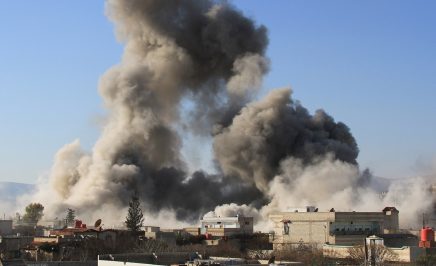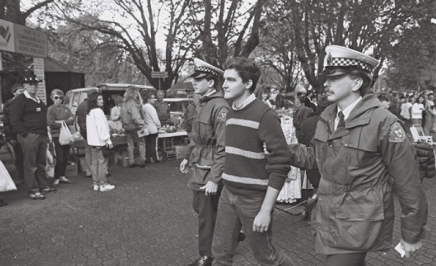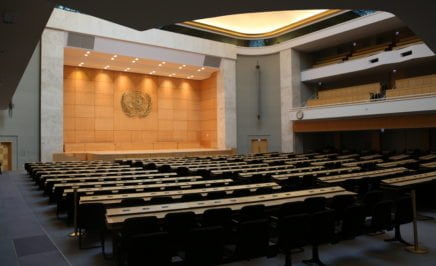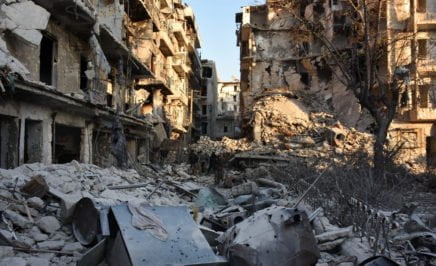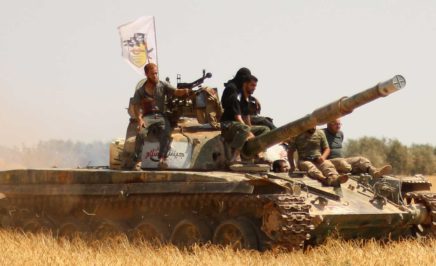For the millions of people who have suffered, and continue to suffer as crimes against humanity go unpunished in Syria, today marks the sixth anniversary of the first major protests that sparked the conflict.
Six years. Six years of living in fear of death by constant bombardment from air strikes, deliberate attacks on civilians, homes, markets, places of worship, schools and hospitals. Six years of extrajudicial executions, enforced disappearances, torture, ill-treatment and mass hangings.
According to the UN special envoy to Syria, the death toll since the beginning of the crisis has surpassed 400,000 – meaning at least one in every 100 Syrians has been killed as a result of the conflict.
More than 20 percent of the Syrian population now live as refugees outside their country, while half of the population still living inside of Syria is in need of life-saving humanitarian assistance. This year must be this war’s last.
“At least one in every 100 Syrians has been killed as a result of the conflict”
Crimes against humanity are being committed every day of this war
Crimes against humanity and war crimes committed by all parties to the conflict in Syria have been widely documented by Amnesty International and other human rights organisations, as well as UN agencies, since the beginning of the crisis.
However, these crimes continue to go unpunished in Syria.
Peace talks have stalled over the years as the UN Security Council has been heavily politicised and crippled in its inability to act. For six years Russia, with the support of China, has blocked Security Council decisions by using its veto power to prevent resolutions from being passed, which would sanction the Syrian government. This behaviour prevents justice from being served and emboldens all parties to the conflict in Syria to act with indifference to international law.
Six harrowing years on, there is no excuse for allowing such horrific crimes that are continuing to be committed in Syria to go unpunished.
Earlier this year Amnesty International published a report called, Human slaughterhouse: Mass hangings and extermination at Saydnaya prison, Syria, prompted an intense reaction in the global media and political spheres.
Given the report’s shocking findings about mass hangings and extermination since 2011, Syrian President Bashar al-Assad claimed Amnesty’s report was circulating “fake news”. There is sadly nothing fake about these findings of the brutal slaughter of Syria’s own people.
The onslaught of Aleppo
On 16 December, 2016 bombardment of an area in East Aleppo packed with civilians began – hours after a truce had been declared – prompting worldwide condemnation and cries that a war crime had been committed. It was a crucial impasse and moral imperative to safely evacuate all people from East Aleppo before the entire area was annihilated.
Amnesty International immediately took action and our supporters in Australia gave generously to the appeal for the people of Aleppo. People such as seven-year-old Bana, who tweeted from rebel-held eastern Aleppo throughout the onslaught. “Tonight we have no house, it’s bombed and I got in rubble. I saw deaths and I almost died,” was her last tweet before her family’s escape.
I was pleased to host @AlabedBana and her family at the Presidential Complex today. Turkey will always stand with the people of Syria. pic.twitter.com/VuPtmFl7Lr
— Recep Tayyip Erdoğan (@RT_Erdogan) December 21, 2016
The eventual ceasefire deal, which saw the evacuation of over 35,000 of civilians from the danger-zone, was the result of sustained worldwide campaigning which led to the UN Security Council finally passing a resolution which allowed UN monitors immediate access to Aleppo to ensure the safe evacuation of civilians under threat.
What’s happening in Syria now?
The UN General Assembly has adopted a resolution giving the people of Syria a glimmer of hope that justice is possible. It called for the establishment of an independent body to assist in the investigation and prosecution of the most serious crimes committed under international law in Syria since March 2011.
The resolution sent a powerful signal in bypassing a deadlocked UN Security Council, which has proven incapable of ending impunity for human rights violations in Syria. The independent body now awaits necessary funds from UN member states to be secured before becoming operational.
“How many more children need to be caught up in the crossfire and denied the right to education?”
As for the immediate fate of this war, Syrian peace talks involving the armed opposition and Russia, Iran and Turkey are scheduled to take place in Kazakhstan again this week following a meeting in Astana on 14-16 February.
The ceasefire has been repeatedly violated however, while the war against jihadist groups such as Islamic State – which are not included under the ceasefire – has raged on.
Enough is enough. How many more years can the people of Syria continue this way? How many more children need to be caught up in the crossfire and denied the right to education?
How you can help
With the Syrian war now in it’s seventh year the safety of refugees fleeing for their lives is only getting worse. The global rhetoric of national security and closing the doors on refugees plays into the hands of the politics of fear. The revised Executive Order announced by the Trump Administration on the 6 March is callous, cruel and discriminatory, not to mention illegal under international human rights law.
The USA has a long history of welcoming refugees and plays a crucial role in global resettlement – now as the world faces more people displaced than ever before – is it not the time to turn their backs on this commitment.
Amnesty International Australia are joining our global movement of over 7 million supporters in calling for not only global condemnation, but for this Executive Order to be repealed.
Will you join us say no to this latest travel ban?

